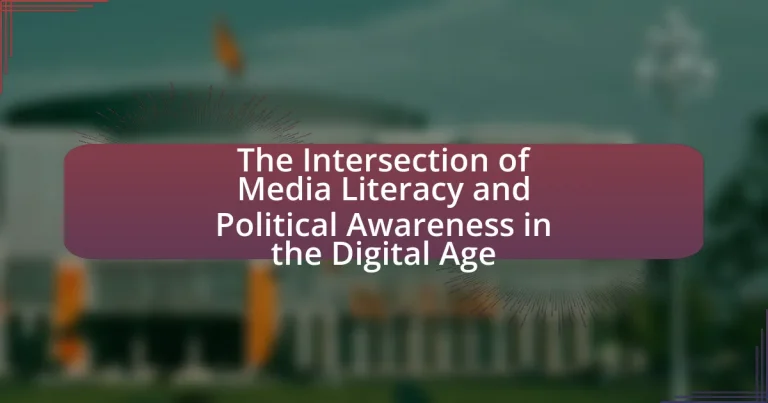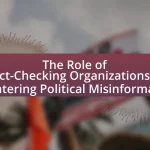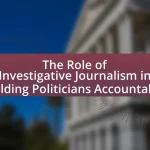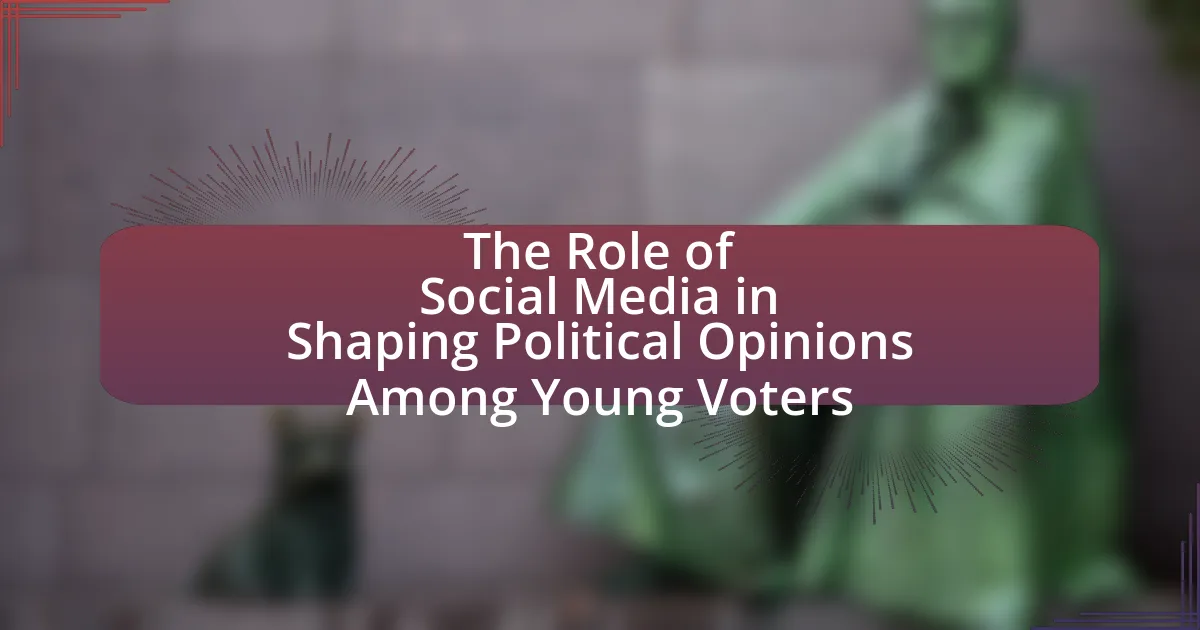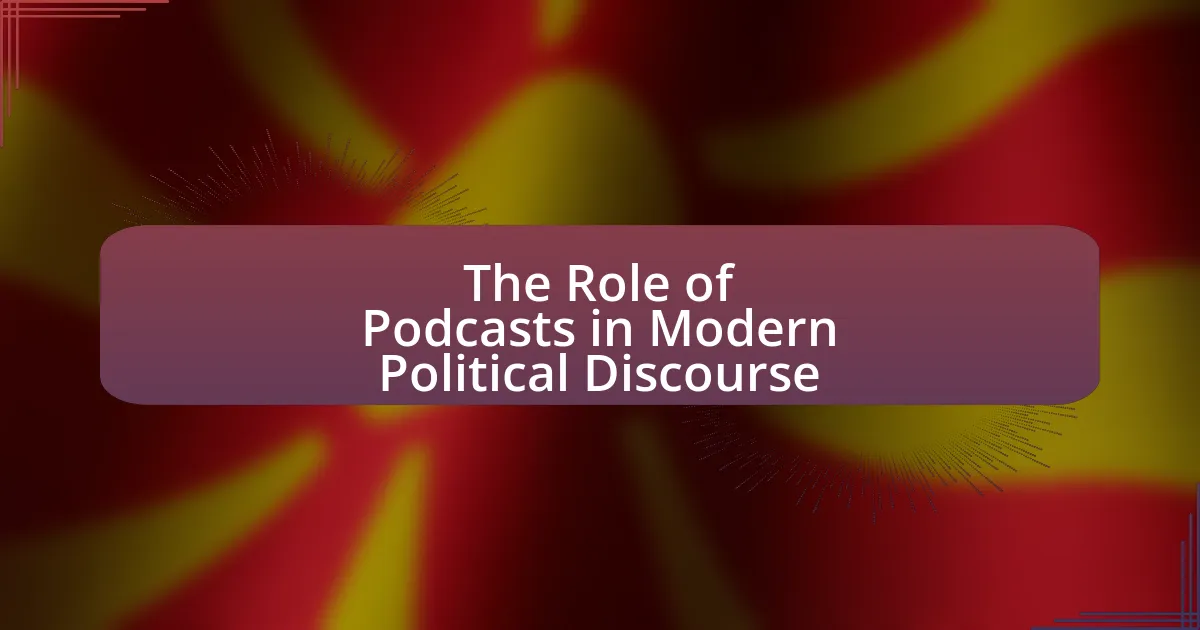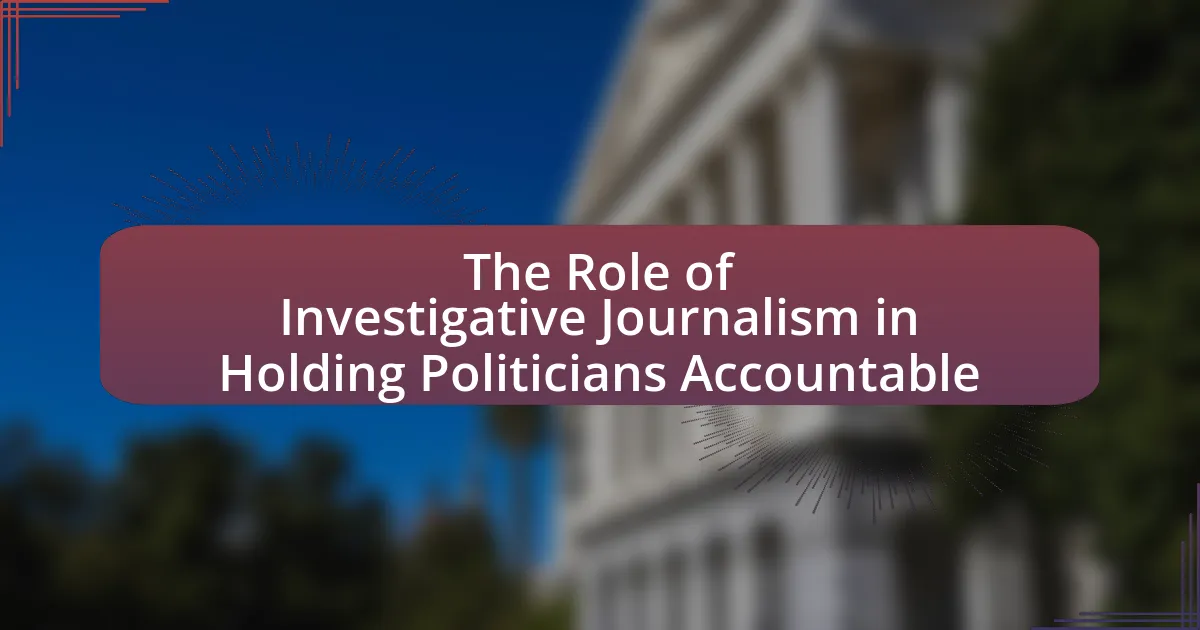The article examines the intersection of media literacy and political awareness in the digital age, emphasizing the critical skills individuals need to analyze and evaluate information from various media sources. It highlights how enhanced media literacy fosters informed political engagement, enabling citizens to discern credible information amidst the prevalence of misinformation. The discussion includes the role of digital technology in shaping media literacy, the impact of political awareness on media consumption habits, and the challenges individuals face in developing these skills. Additionally, it explores strategies for improving media literacy and political awareness, the effects of the digital divide, and the importance of community organizations in promoting civic engagement.
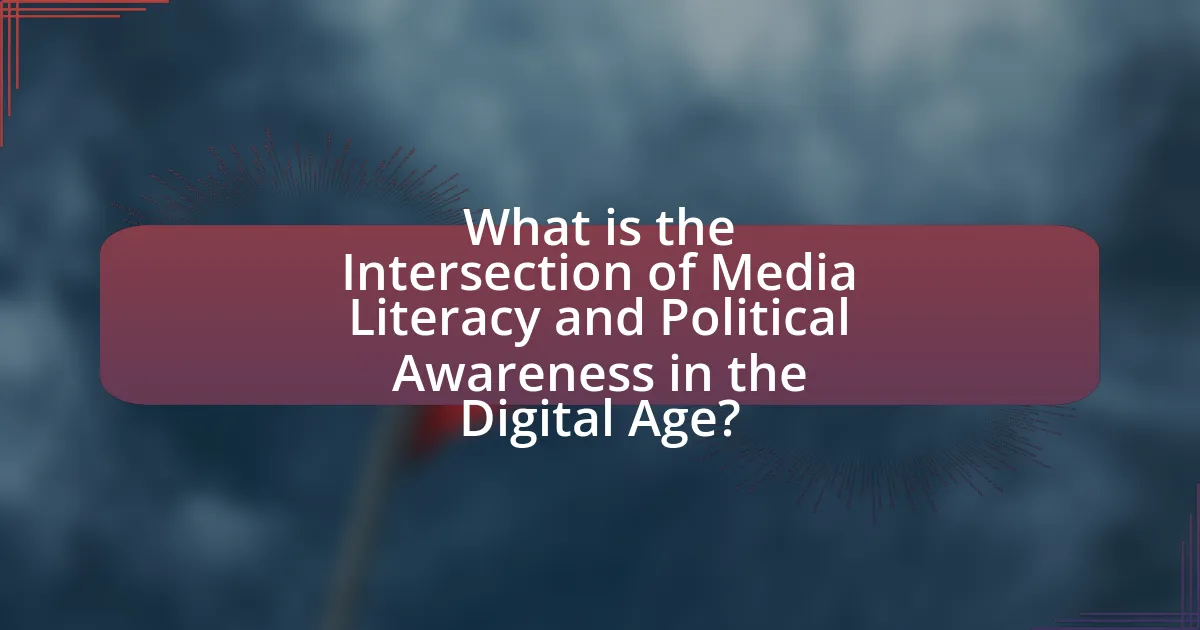
What is the Intersection of Media Literacy and Political Awareness in the Digital Age?
The intersection of media literacy and political awareness in the digital age is characterized by the ability of individuals to critically analyze and evaluate information from various media sources, which directly influences their understanding of political issues and participation in democratic processes. In today’s digital landscape, where misinformation and biased narratives proliferate, media literacy equips citizens with the skills to discern credible information, thereby enhancing their political awareness and engagement. Studies indicate that individuals with higher media literacy are more likely to engage in informed political discussions and make educated voting decisions, as evidenced by research from the Pew Research Center, which found that 64% of adults who actively seek out diverse news sources report feeling more informed about political issues.
How do media literacy and political awareness interact in today’s society?
Media literacy and political awareness interact in today’s society by enabling individuals to critically evaluate information sources and engage in informed civic participation. As misinformation proliferates through digital platforms, enhanced media literacy equips citizens with the skills to discern credible news from false narratives, thereby fostering a more informed electorate. Research indicates that individuals with higher media literacy are more likely to engage in political discussions and participate in democratic processes, as evidenced by a study published in the Journal of Communication, which found that media-savvy individuals are 30% more likely to vote compared to those with lower media literacy levels. This interaction underscores the importance of education in both media literacy and political engagement to strengthen democratic societies.
What role does digital technology play in shaping media literacy?
Digital technology plays a crucial role in shaping media literacy by providing access to diverse information sources and facilitating critical analysis of content. The proliferation of digital platforms enables users to engage with various media formats, enhancing their ability to discern credible information from misinformation. For instance, a study by the Pew Research Center in 2021 found that 64% of Americans believe that social media has a significant impact on their understanding of current events, highlighting the importance of digital literacy in navigating these platforms. Furthermore, digital tools such as fact-checking websites and media literacy programs empower individuals to evaluate the reliability of information, fostering informed citizenship in a politically charged environment.
How does political awareness influence media consumption habits?
Political awareness significantly influences media consumption habits by shaping individuals’ preferences for news sources and content. Individuals with higher political awareness tend to seek out diverse and credible information to stay informed about political issues, often gravitating towards reputable news outlets and platforms that provide in-depth analysis. Research indicates that politically aware individuals are more likely to engage with media that aligns with their values and beliefs, which can lead to selective exposure and confirmation bias. For instance, a study published in the Journal of Communication found that politically engaged individuals prefer news that reinforces their existing views, impacting their overall media consumption patterns.
Why is understanding this intersection important for citizens?
Understanding the intersection of media literacy and political awareness is crucial for citizens because it empowers them to critically evaluate information and make informed decisions. In the digital age, where misinformation can spread rapidly through social media, citizens equipped with media literacy skills can discern credible sources from unreliable ones, thereby enhancing their political engagement and participation. Research indicates that individuals with higher media literacy are more likely to engage in civic activities and understand political processes, as evidenced by a study published in the Journal of Communication, which found that media literacy education significantly improves political knowledge and engagement among young adults.
What are the potential consequences of low media literacy on political engagement?
Low media literacy can lead to decreased political engagement, as individuals may struggle to critically evaluate information and discern credible sources. This lack of critical thinking can result in susceptibility to misinformation, which can skew public perception and influence voting behavior. For instance, a study by the Pew Research Center found that individuals with lower media literacy are more likely to believe false information about political candidates, ultimately affecting their participation in elections. Additionally, low media literacy can foster apathy towards political issues, as individuals may feel overwhelmed or confused by the information landscape, leading to disengagement from civic activities.
How can increased political awareness enhance media literacy skills?
Increased political awareness enhances media literacy skills by enabling individuals to critically evaluate information sources and discern biases in media content. When individuals are politically aware, they are more likely to recognize the influence of political agendas on media narratives, which fosters a deeper understanding of how information is constructed and disseminated. Research indicates that individuals with higher political awareness are better equipped to identify misinformation and propaganda, as they can contextualize media messages within broader political frameworks. For example, a study by the Pew Research Center found that politically engaged individuals are more adept at distinguishing between credible news sources and those that promote false information, thereby improving their overall media literacy.
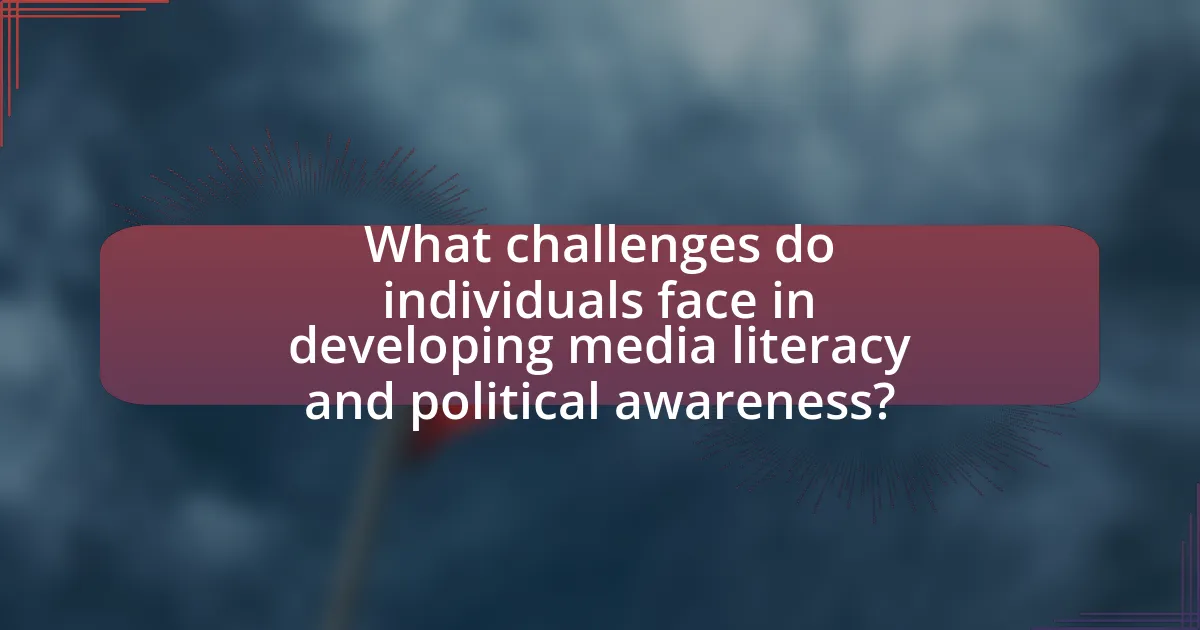
What challenges do individuals face in developing media literacy and political awareness?
Individuals face several challenges in developing media literacy and political awareness, primarily due to misinformation, cognitive biases, and the overwhelming volume of information available online. Misinformation, including fake news and misleading content, can distort individuals’ understanding of political issues, making it difficult to discern credible sources. Cognitive biases, such as confirmation bias, lead individuals to favor information that aligns with their pre-existing beliefs, further hindering objective analysis. Additionally, the sheer volume of information on social media platforms can overwhelm users, making it challenging to filter relevant and accurate content. According to a 2020 study by the Pew Research Center, 64% of Americans believe that misinformation has a significant impact on their understanding of political issues, highlighting the pervasive nature of these challenges.
What misinformation and disinformation tactics are prevalent in the digital age?
Misinformation and disinformation tactics prevalent in the digital age include the use of deepfakes, social media bots, and clickbait headlines. Deepfakes manipulate video and audio content to create false narratives, making it difficult for viewers to discern truth from fabrication. Social media bots amplify misleading information by automating the sharing of content, often creating the illusion of consensus or popularity around false claims. Clickbait headlines attract attention through sensationalism, leading to the spread of misleading articles that do not accurately represent their content. According to a study by the Pew Research Center, 64% of Americans believe that fabricated news stories cause confusion about the basic facts of current events, highlighting the significant impact of these tactics on public perception and understanding.
How do these tactics affect public perception and political discourse?
Tactics such as misinformation, targeted advertising, and emotional appeals significantly shape public perception and political discourse. These strategies manipulate information to create polarized views, often leading to a misinformed electorate. For instance, studies show that misinformation can decrease trust in traditional media sources, as seen during the 2016 U.S. presidential election, where false narratives spread rapidly on social media platforms, influencing voter opinions and behaviors. Additionally, targeted political ads exploit user data to reinforce existing beliefs, further entrenching divisions within the public. This manipulation of information not only distorts individual understanding but also complicates constructive political dialogue, as citizens become more entrenched in their views and less open to opposing perspectives.
What strategies can individuals use to identify misinformation?
Individuals can identify misinformation by employing strategies such as fact-checking, cross-referencing sources, and analyzing the credibility of information. Fact-checking involves using reputable websites like Snopes or FactCheck.org to verify claims. Cross-referencing entails comparing information across multiple reliable sources to ensure consistency and accuracy. Analyzing credibility includes assessing the author’s qualifications, the publication’s reputation, and the presence of citations or references. Research indicates that media literacy education significantly enhances individuals’ ability to discern misinformation, as demonstrated in studies by the Stanford History Education Group, which found that students often struggle to evaluate online information critically.
How does the digital divide impact media literacy and political awareness?
The digital divide significantly hinders media literacy and political awareness by creating disparities in access to information and technology. Individuals without reliable internet access or digital skills are less likely to engage with diverse media sources, limiting their ability to critically evaluate information and participate in political discourse. According to the Pew Research Center, as of 2021, 25% of adults in lower-income households reported not having home broadband, which directly correlates with lower levels of political engagement and awareness. This lack of access restricts opportunities for informed decision-making and civic participation, ultimately perpetuating inequalities in political representation and engagement.
What groups are most affected by the digital divide?
Low-income individuals, rural communities, the elderly, and racial and ethnic minorities are the groups most affected by the digital divide. These populations often lack access to reliable internet and digital devices, which hinders their ability to engage with online resources and participate in the digital economy. For instance, a 2021 report by the Pew Research Center found that 44% of lower-income households in the U.S. do not have broadband internet access, compared to only 4% of higher-income households. Additionally, rural areas face significant infrastructure challenges, with 23% of rural Americans lacking access to high-speed internet. This disparity in access exacerbates existing inequalities in education, employment, and civic engagement, highlighting the critical need for targeted interventions to bridge the digital divide.
How can bridging the digital divide improve political engagement?
Bridging the digital divide can significantly improve political engagement by ensuring equitable access to information and communication technologies. When individuals from all socioeconomic backgrounds have access to the internet and digital tools, they can participate more actively in political discourse, access government resources, and engage in civic activities. For instance, a study by the Pew Research Center found that internet users are more likely to engage in political activities, such as discussing politics online or sharing political content, compared to non-users. This increased access fosters a more informed electorate, enabling citizens to make better decisions and hold their representatives accountable.
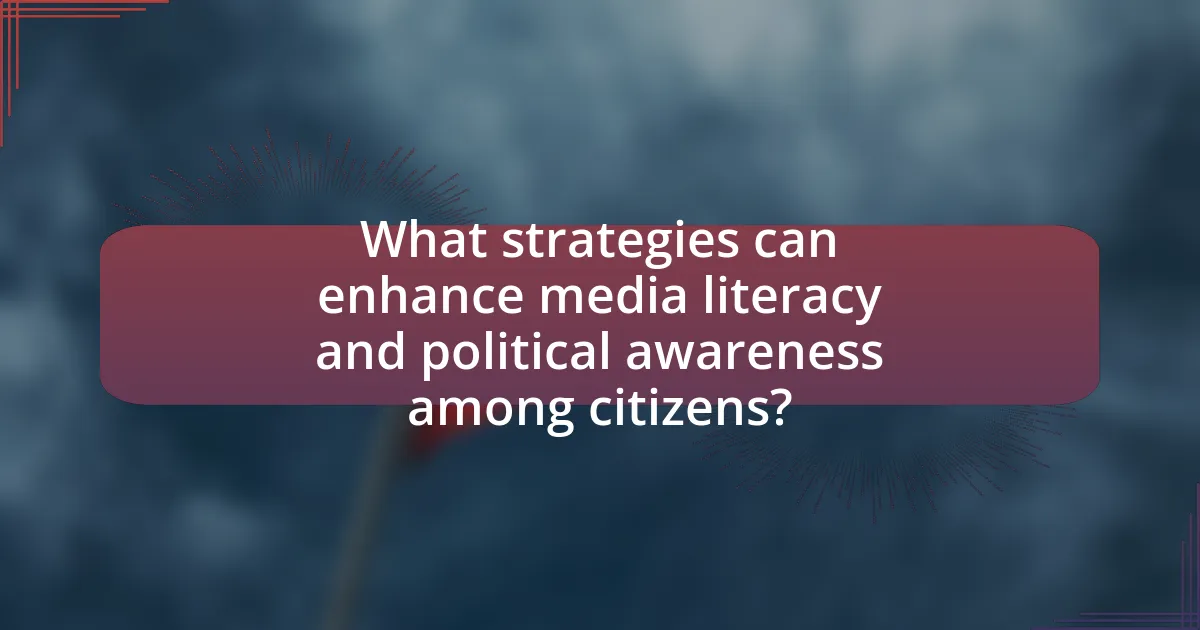
What strategies can enhance media literacy and political awareness among citizens?
Educational programs that focus on critical thinking and analysis of media content can significantly enhance media literacy and political awareness among citizens. These programs should include workshops and courses that teach individuals how to evaluate sources, recognize bias, and understand the impact of misinformation. Research indicates that media literacy education can lead to improved critical thinking skills, as evidenced by a study published in the Journal of Media Literacy Education, which found that participants who underwent media literacy training demonstrated a 30% increase in their ability to discern credible information from falsehoods. Additionally, promoting community discussions and forums that encourage dialogue about current events can foster a more informed citizenry, as active engagement in political discourse has been shown to correlate with higher levels of political awareness.
What educational programs are effective in promoting media literacy?
Educational programs that are effective in promoting media literacy include the Media Literacy Now initiative, which advocates for media literacy education in K-12 schools, and the News Literacy Project, which provides resources to help students discern credible information. These programs focus on critical thinking skills, enabling individuals to analyze and evaluate media content effectively. Research indicates that students who participate in structured media literacy programs demonstrate improved skills in identifying misinformation and understanding media influence, as evidenced by studies conducted by the Stanford History Education Group, which found that only 20% of high school students could accurately evaluate the credibility of online sources.
How can schools integrate media literacy into their curricula?
Schools can integrate media literacy into their curricula by incorporating dedicated media literacy courses and embedding media analysis into existing subjects. Research indicates that teaching students to critically evaluate media sources enhances their ability to discern credible information, which is essential in the digital age where misinformation is prevalent. For instance, the National Association for Media Literacy Education emphasizes the importance of teaching skills such as analyzing media messages, understanding media production processes, and recognizing bias. By implementing these strategies, schools can equip students with the necessary tools to navigate and engage with media effectively, fostering informed and politically aware citizens.
What role do community organizations play in fostering political awareness?
Community organizations play a crucial role in fostering political awareness by providing education, resources, and platforms for civic engagement. These organizations often conduct workshops, forums, and outreach programs that inform individuals about political processes, rights, and responsibilities. For instance, organizations like the League of Women Voters have historically engaged communities through voter registration drives and educational campaigns, significantly increasing voter turnout and political participation. Research indicates that communities with active organizations experience higher levels of political engagement, as these entities bridge the gap between citizens and the political system, empowering individuals to make informed decisions.
How can individuals take personal responsibility for their media consumption?
Individuals can take personal responsibility for their media consumption by critically evaluating the sources and content they engage with. This involves verifying the credibility of information by checking the author’s qualifications, the publication’s reputation, and cross-referencing facts with reliable sources. Research indicates that media literacy education enhances individuals’ ability to discern misinformation, with studies showing that informed consumers are less likely to fall for fake news. For instance, a study published in the journal “Communication Research” found that individuals with higher media literacy skills are more adept at identifying biased or misleading information. By actively questioning and analyzing the media they consume, individuals can make informed choices that contribute to a more informed society.
What best practices should individuals follow to critically evaluate media sources?
Individuals should follow several best practices to critically evaluate media sources, including checking the credibility of the source, analyzing the author’s qualifications, and verifying the information against multiple reputable outlets. Credible sources typically have a history of accuracy and transparency, while authors with relevant expertise provide more reliable insights. Additionally, cross-referencing facts with established news organizations or academic publications helps confirm the validity of the information presented. Research indicates that media literacy significantly enhances individuals’ ability to discern credible information, which is crucial in the context of the digital age where misinformation is prevalent.
How can social media users promote accurate information sharing?
Social media users can promote accurate information sharing by critically evaluating sources before sharing content. This involves verifying the credibility of the information by checking the author’s qualifications, the publication’s reputation, and cross-referencing facts with reliable sources. Research indicates that misinformation spreads rapidly on social media, with a study by Vosoughi, Roy, and Aral (2018) in “Science” revealing that false news stories are 70% more likely to be retweeted than true stories. By prioritizing accuracy and sharing only verified information, users can significantly reduce the spread of misinformation and contribute to a more informed public discourse.
What are the best practices for fostering media literacy and political awareness in the community?
The best practices for fostering media literacy and political awareness in the community include implementing educational programs, promoting critical thinking, and encouraging active participation in civic activities. Educational programs should focus on teaching individuals how to analyze media sources, discern credible information, and understand the impact of media on public opinion. Research indicates that communities with structured media literacy initiatives, such as those developed by the National Association for Media Literacy Education, see improved critical thinking skills among participants. Additionally, promoting critical thinking through workshops and discussions can help individuals evaluate information more effectively. Encouraging active participation in civic activities, such as town hall meetings and local elections, further enhances political awareness by providing practical experience in democratic processes. These practices collectively contribute to a more informed and engaged community.
